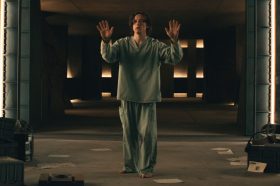Thongkam and Sek, a loving, hard-working gay couple, have just gotten married. After tirelessly bringing their Durian farm, ‘KamSek’, to life, they felt it was only logical to wed and look forward to their happily-ever-after.
But in The Paradise of Thorns, things don’t go as planned (do they ever?), and after a nasty fall leads to Sek’s (Pongsakorn Mettarikanon) untimely death, his mother and adopted sister swiftly move in to take advantage of the men’s unrecognised union.
With same-sex marriage then illegal in Thailand, and draconian estate laws ensuring that blood-relatives are entitled to Sek’s farm, Thongkam (Jeff Satur) has no claim to stay on the durian farm he once devotedly maintained. The house and orchard now belong to Sek’s mother Saeng (Srida Puapimol), her adopted daughter/live-in helper Mo, and her gardener Jingna (Harit Buayoi) – all of whom have never stepped foot on the farm.
Head to head
After directing a bunch of Thai TV dramas, The Paradise of Thorns is Boss Kuno’s feature directorial debut. Applying what he learned on the set of serialised television, the visuals of Thorns are very high quality, the young cast are suitably attractive, and the dramatic tension is high – even rivalling that of Game of Thrones. After all, we’re witnessing what is essentially a tale of politics, love and backstabbing.
The plot, written by Kuno and collaborators Naron Cherdsoongnern and Karakade Norasethaporn, is very much a passionate response to Thailand’s lack of recognition and protection for same-sex couples. It was only in March of this year that Thailand’s House of Representatives actually approved a marriage equality bill, which was adopted by the Thai Senate in June. That means that by the end of this year, same-sex marriage should be fully legal in Thailand. The fictional scenario in The Paradise of Thorns, which includes scenes of the men being unable to make decision’s on the other’s behalf when one is incapacitated, is just one example of why marriage equality is so important everywhere.

The actors bring a similar passion to their work: Engfa Waraha as Mo is complex and formidable; a Cersei Lannister-type tactician who came from nothing and is determined never to return to it. Since much of the story takes place from Thongkam’s perspective, Mo is initially painted as a villain, but Waraha’s nicely rounded performance shows us there is more to her.
Jeff Satur as Thongkam is sympathetic and desperate, a character you can really root for even when his methods for staying on the farm are morally questionable. His encounters with the gardener Jingna (who also happens to be Mo’s biological brother) eventually blossom into a tender romance, and soon you find yourself rooting for them both to find peace in any way they can. Alas, a third-act breaking point for Thongkam puts an end to that fantasy.
Let the picture speak for itself
The Paradise of Thorns is at its best in its quiet moments: whether that be a steely-eyed showdown between feuding family members, an erotic moment betwixt mosquito nets, unspoken despair at a funeral, or the methodical propagation and harvesting of the durian fruit. The masterful use of light in these scenes, whether that be the capture of a sunset over the orchard, the dancing shadows underneath a tree, or the crackling of a fire pit in total darkness, creates some beautifully arresting images.

Nearly all of it is spoiled, however, by an overly lengthy plot and an obsession with ‘gotcha’ moments that all attempt to outdo each other, heightening every dramatic beat to the point where it becomes ridiculous. The final showdown in the orchard is all too guilty of this. Additionally, the attempts to justify every character’s actions winds up flattening the emotional depth of the narrative. Not every action has to be forgivable – and tragic backstories are no substitute for a well-written character.
While beautifully shot and embedded with a compelling cry for marriage equality, The Paradise of Thorns ultimately leans too hard into melodrama, turning what could be a powerful drama into a 130-minute soap opera. An unintended consequence of this is that the central message of marriage equality becomes quite lost in the weeds, save for a few really solid scenes that demonstrate the potential of what the film could have been.
The Paradise of Thorns is in select cinemas now.
Actors:
Jeff Satur, Engfa Waraha
Director:
Boss Kuno
Format: Movie
Country: Thailand
Release: 19 September 2024





